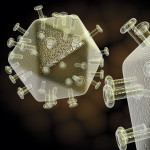A study of Gilead Science’s “quad” fixed-dose combination tablet containing the experimental integrase inhibitor elvitegravir and boosting agent cobicistat, along with tenofovir and emtricitabine, has met its primary objective—“non-inferiority” compared to mainstay therapy Atripla—according to an announcement by the company.
According to Gilead—full results have not yet been presented or published—88 percent of those who took the quad tablet in the study had undetectable viral loads (less than 50 copies) after 48 weeks of treatment, compared with 84 percent of those who took Atripla. The clinical trial enrolled 352 people living with HIV starting antiretroviral therapy for the first time.
CD4 increases were significantly more substantial among those receiving the quad compared to Atripla: 239 versus 206 cells, respectively.
The company claims rates of moderate-to-severe adverse events were similar between the quad-treated and Atripla-treated groups. Discontinuation rates due to adverse events were comparable in both groups of the study.
The Phase III research program for Gilead’s quad tablet includes two studies (Studies 102 and 103) evaluating the all-in-one regimen versus a standard of care among people starting HIV treatment for the first time. Like the encouraging results from Study 102, highlighted in the Gilead statement, data from a Phase II study also suggest the quad has similar efficacy to Atripla.
Study 103, still under way, is comparing the efficacy, safety and tolerability of the quad tablet, compared with Norvir (ritonavir)-boosted Reyataz (atazanavir) combined with Truvada (tenofovir plus emtricitabine).
Gilead plans to submit the results from Study 102 for presentation at a scientific conference early next year.
Advertisement
Advertisement
Advertisement






Comments
Comments